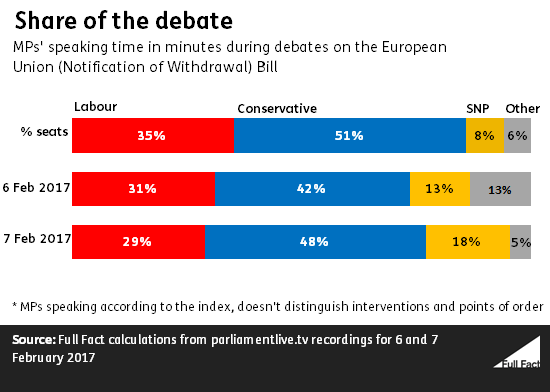Prime Minister's Questions, factchecked
Join 72,953 people who trust us to check the facts
Sign up to get weekly updates on politics, immigration, health and more.
Subscribe to weekly email newsletters from Full Fact for updates on politics, immigration, health and more. Our fact checks are free to read but not to produce, so you will also get occasional emails about fundraising and other ways you can help. You can unsubscribe at any time. For more information about how we use your data see our Privacy Policy.
“One in six Accident and Emergency units in England are set to be closed or downgraded.”
Jeremy Corbyn, 8 February 2017
Research has identified one in six A&E units which could be closed or downgraded—but it’s more speculative than set in stone at this stage. And the loss of some units won’t represent an equivalent loss in service provision, in every case.
Mr Corbyn is referring to analysis from the Health Service Journal, published earlier this week. It identified 24 major A&E units that could be downgraded or closed altogether in the next four years—about 15% of departments across the country.
The figure is mostly based on analysing public plans and statements from NHS trusts across the country.
But not all of these are confirmed closure or downgrade plans.
Of the 24, four will be downgraded and three will be closed. The rest have plans that aren’t finalised or are up for consultation. The researchers say these units could be downgraded or closed, but could equally be kept or upgraded.
In the case of City Hospital and Sandwell and District General Hospital in Birmingham, the planned closures are set to be replaced by a new hospital anyway.
So we don’t necessarily know how services will actually be affected by these changes.
“He refers specifically to Accident and Emergency. What is our response on Accident and Emergency? We see 600 more A&E consultants, 1,500 more A&E doctors, and 2,000 more paramedics.”
Theresa May, 8 February 2017
These figures are all roughly correct, comparing to 2010 each time, although departments have still been facing increased pressures to cope with demand.
12,500 paramedics worked in the NHS in October last year, the latest figures. At the same point in 2010 it was about 10,300—so about the same size increase the Prime Minister is referring to.
Similarly you’d find over 1,600 A&E consultants at the moment and 1,050 back in 2010, not far off the 600 increase being quoted.
In total about 6,350 doctors of all grades work in emergency medicine now compared to 5,050 at the same time back in 2010. That’s about 1,300 more, so a little less than Mrs May claims.
It’s still the case that A&E units across the country are facing severe pressures to meet rising demand, and experts from the King’s Fund have warned in the past that departments still face difficulties in recruiting and retaining staff.
Our staffing figures use full-time equivalent counts.
“Half a trillion pounds… we’ll be spending on the NHS this parliament.
Theresa May, 8 February 2017
Half a trillion—or £500 billion— is underselling it a little. Spending on the NHS in England is expected to be almost £550 billion in today’s money from 2015/16 to 2019/20.
That’s if you add up planned spending in each of those five years. While this generates an impressively big number, it’s not necessarily that meaningful. If talking about your salary, would you say “I get paid £20,000 a year” or “I’ll be paid £100,000 over a five-year contract”?
Apart from anything else, the amount of money spent doesn’t say anything about whether it’s going to the right places or keeping up with the demand on the health service.
Health experts from the Nuffield Trust, Health Foundation and King’s Fund say current spending plans aren’t enough to maintain standards of care, meet rising patient demand and deliver new services such as the so-called “seven-day NHS”.
We’ve broken down the NHS spending figures here.
“Does the Prime Minister agree that in a twenty-first century parliament the rules should not enable any member to speak for 58 minutes in a three-hour debate?”
Patrick Grady MP, 8 February 2017
“I have to say I find that a rather curious question from the honourable gentleman. Last night as it happens I was out of the house between the two votes. I switched on the BBC Parliamentary channel and I saw the honourable gentleman speaking, I turned over to something else, I switched back to the parliamentary channel, I saw the honourable gentleman still speaking...”
Theresa May, 8 February 2017
As Mr Grady says, he himself spoke for 58 minutes during last night’s debate on leaving the EU. That’s an unusually long time and some people consider it filibustering, or deliberately wasting time. He said it was in response to some of his SNP colleagues being unable to speak in the debate the night before because of lack of time.
Mr Grady didn’t speak for 58 minutes straight but took short points from many SNP members, and some from other parties.
The SNP’s overall share of speaking time during the evening increased from 13% to 18% compared to the previous day’s debate.

If the Chair or Speaker thinks an MP is straying off topic or simply repeating themselves they can cut them off, but the power is rarely used. The Chair did ask MPs yesterday to stay on topic. As the discussion was focused on the SNP’s amendments it was within the rules, however long Mr. Grady spoke for.
A Commons committee has recommended recently that the system is changed to stop filibustering and give Private Member’s Bills bills a better chance to become law.